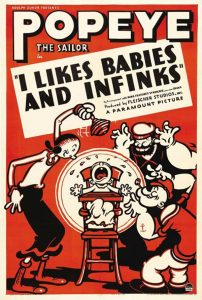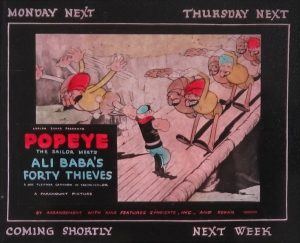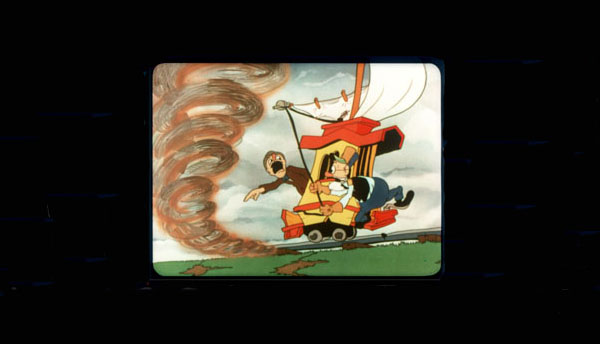 That’s the warning that Paramount might have given to their exhibitors, when they announced that there would be a second Popeye two-reel special in Technicolor. Instead, the exhibitors flung the doors wide open. The dimes and quarters contributed by the moppets would have been matched by those of the adults who came along in tow. Never mind what the feature was – it was Popeye! Returns must have been good – as in later years, even Famous would claim the continued benefits of the material, by re-utilizing the footage from Fleischers’ three featurettes as the basis for their own extended-length “cheaters” with new sound and wraparound material – as well as in a shorter cheater, “Spinach Packin’ Popeye”, which would use the climactic battle from “Ali Baba” intact with original track. Rank and file monochrome cartoons also continued unabated, scoring with customers and exhibitors alike.
That’s the warning that Paramount might have given to their exhibitors, when they announced that there would be a second Popeye two-reel special in Technicolor. Instead, the exhibitors flung the doors wide open. The dimes and quarters contributed by the moppets would have been matched by those of the adults who came along in tow. Never mind what the feature was – it was Popeye! Returns must have been good – as in later years, even Famous would claim the continued benefits of the material, by re-utilizing the footage from Fleischers’ three featurettes as the basis for their own extended-length “cheaters” with new sound and wraparound material – as well as in a shorter cheater, “Spinach Packin’ Popeye”, which would use the climactic battle from “Ali Baba” intact with original track. Rank and file monochrome cartoons also continued unabated, scoring with customers and exhibitors alike.
I Like Babies and Infinks (9/16/37) – A simple premise: Olive is trying to take care of Swee’pea and stop him from crying at the top of his lings. Olive finds the time to call Popeye down from several floors above in their flats, to stop Swee’pea’s crying. Bluto hears about this, and decides to horn in. Their efforts to calm the little “infink kid” lead to the usual fight. Popeye reaches up to a top shelf for a can of spinach, but gets a can of onions instead. Their perfume fills the air, until Popeye, Bluto, and Olive are blubbering uncontrollably. This makes Swee’pea start laughing hysterically, unexpectedly solving their problem. Songs: A bunch of old standard favorites: “Sailor’s Hornpipe”, “The Old Gray Mare”, and “Carnival of Venice”.
 Popeye the Sailor Meets Ali Baba’s Forty Thieves (11/21/37) – Popeye, on duty for the Coast Guard, hears a radio bulletin about the raids of Abu Hassan (Bluto) and his Forty Thieves in the Arabian desert. The bulletin is unspecific as to directions, merely pointing by means of an electric bolt from the loudspeaker “Thatta way” – so Popeye conducts a continent-hopping search for the bandit with a flying boat, “Skipping the gutter” across several oceans. His boat develops engine trouble, stranding himself and passengers Olive and Wimpy in the desert. To get his friends through the heat, Popeye reshapes them into humped camels, then assembles the three of them together like a tank tread to reach a walled city. The three enter a café, where Popeye has trouble reading a foldable menu (“This writing’s written rotten”) until the waiter turns back flaps of the menu to transform what appears to be Arabic lettering into “Ham and Eggs – 45 cents”. Their repast is interrupted by the arrival of the bandits, who ransack the village. Abu Hassan challenges Popeye, with Popeye retaliating by reaching into the bandit’s belt and pulling off his red flannels. “Abu has’n got ‘em any more”. The thieves make off with Olive and Wimpy to the famous “Sesame” cave, while Popeye pursues on camel (borrowing a gag from Ub Iwerks by filling the camel’s humps at a filling station). A superb battle rages within, with Popeye briefly imperiled over a shark pit, but obtaining his spinach with the call, “Open, sez me.” The thieves are bounced around like bowling pins, and Bluto placed in chains. Together, the entire bandit crew haul back their stolen treasure to the city with Popeye, Olive and Wimpy aboard the wagon carrying the lot (an ending also lifted from Iwerks’ Comicolor “Ali Baba”, though Iwerks did not have the budget to pull it off in flashy fashion as Fleischer did with his turntable camera). Songs: an original for Gus Wicke. “Abu Hassan” (music credit on the film is divided into four names – Sammy Timberg, Tot Seymour, Dee Lawnhurst, and Sammy Lerner). Sing along:
Popeye the Sailor Meets Ali Baba’s Forty Thieves (11/21/37) – Popeye, on duty for the Coast Guard, hears a radio bulletin about the raids of Abu Hassan (Bluto) and his Forty Thieves in the Arabian desert. The bulletin is unspecific as to directions, merely pointing by means of an electric bolt from the loudspeaker “Thatta way” – so Popeye conducts a continent-hopping search for the bandit with a flying boat, “Skipping the gutter” across several oceans. His boat develops engine trouble, stranding himself and passengers Olive and Wimpy in the desert. To get his friends through the heat, Popeye reshapes them into humped camels, then assembles the three of them together like a tank tread to reach a walled city. The three enter a café, where Popeye has trouble reading a foldable menu (“This writing’s written rotten”) until the waiter turns back flaps of the menu to transform what appears to be Arabic lettering into “Ham and Eggs – 45 cents”. Their repast is interrupted by the arrival of the bandits, who ransack the village. Abu Hassan challenges Popeye, with Popeye retaliating by reaching into the bandit’s belt and pulling off his red flannels. “Abu has’n got ‘em any more”. The thieves make off with Olive and Wimpy to the famous “Sesame” cave, while Popeye pursues on camel (borrowing a gag from Ub Iwerks by filling the camel’s humps at a filling station). A superb battle rages within, with Popeye briefly imperiled over a shark pit, but obtaining his spinach with the call, “Open, sez me.” The thieves are bounced around like bowling pins, and Bluto placed in chains. Together, the entire bandit crew haul back their stolen treasure to the city with Popeye, Olive and Wimpy aboard the wagon carrying the lot (an ending also lifted from Iwerks’ Comicolor “Ali Baba”, though Iwerks did not have the budget to pull it off in flashy fashion as Fleischer did with his turntable camera). Songs: an original for Gus Wicke. “Abu Hassan” (music credit on the film is divided into four names – Sammy Timberg, Tot Seymour, Dee Lawnhurst, and Sammy Lerner). Sing along:
Fowl Play (12/17/37) – Popeye buys Olive a parrot, to serve as a remebrance to her when Popeye has to go to sea again. The bird wears a sailor’s hat, smokes a pipe, and talks in his special brand of sailor’s lingo. This cartoon must take place during the winter, though no snow is seen, as the trees are bare – giving meddling Bluto the chance to chase the parrot up one, pursuing him with an axe to cut through the branches. As Popeye joins the fight, the parrot delivers a blow-by-blow description of the battle, spoken into a ventilation duct to make it sound like radio (including the “Excited!, Who’s excited?” radio catch phrase of the day). Popeye’s extra spinach power ultimately lands Bluto behind bars in the parrot’s cage. Songs: an original, “Shiver Me Timbers, Blow Me Down”, a love song Popeye has taught the parrot, uncredited as to composers, though likely from the usual suspects.
Let’s Celebrake (1/21/38) – It’s New Years’ Eve, and Popeye and Bluto, dressed to the nines, arrive in a two-horse sleigh to take Olive out for the holiday. They get ready to go, but at the lasrt moment, Popeye refuses to let Grandma Oyl sit alone on New Years’ Eve – and becomes her date for the evening. Bluto is puzzled by this move, as Granny is a feeble old thing, barely able to hear, let alone dance. Popeye attempts to entertain her by tickling her under the chin with a holiday party favor, but finally breaks out the spinach for both of them to really get in the mood, and allow them to take over the floor in a dance exhibition. Songs: “New Years’ Comes But Once a Year” (a rewording of “Christmas Comes But Once a Year” from the Color Classic of the previous season), sung by Popeye, Bluto, and the two horses (wearing dickeys, yet!). “Swing High, Swing Low”, from a Fred MacMurray picture of the same name, was recorded by Vincent Lopez for Melotone, Perfect, et al., Tempo King on Bluebird, the Ink Spots on Decca (in one of their welcome jive outings), and Russ Morgan for Brunswick, “Silver Threads Among the Gold” was recorded by Henry Burr for Victor and many other labels. Also returning are “Blossoms on Broadway”. “Stop, You’re Breaking My Heart”. “Jammin’”, “Sailor’s Hornpipe”. “Happy Days are Here Again”, and “Auld Lang Syne”.
Learn Polikeness (2/18/38) – Professor “Bluteau” is running a school to teach how to be a gentleman. After a panning shot of his school showcasing the work of the turntable camera, we see Bluteau for the fraud that he is – with his stocking feet up on the desk, reading a Detective magazine. Popeye and Olive pass under the canopy of his entrance, and Olive decides Popeye needs gentleman lessons, so drags him in. Bluteau reacts as you would expect upon seeing Olive, but sees little potential in his subject pupil. After some humiliating failures in initial lessons in etiquette, Bluteau throws the book at Popeye, and states “Come back in ten years.” Popeye ingests some of that green leafy stuff, and becomes a man od distinction. Bleuteau gets his expected thrashing, but in rather discrete fashion, Popeye maintaining his “class” throughout. Bluto winds up on the rack in a costume rental shop, under sign reading “Look like a gentleman. Fool your friends” (which I believe was a slogan then appearing in pulp magazine ads). Songs: “Cocktails For Two”, from the 1934 film, Murder at the Vanities, was recorded by Duke Ellington on Victor, Johnny Green on Brunswick, a vocal by Carl Brisson (below) on Brunswick, and a piano solo by Art Tatum on Decca. It later received the “treatment” by Spike Jones and his City Slickers on Victor, resulting in as comic million seller. Also returning is “The Champagne Waltz”, opening the film.
The House Builder-Upper (3/19/38) – Olive’s house has just burned down – thanks to trying to clean her dress with a gallon of gasoline. The volunteer fire department, consisting of Popeye and Wimpy, arrives a trifle late. “Sorry we couldn’t be here for your house warming”. They offer to build Olive a new house. Popeye, on the roof, treats shingles as if playing cards, dealing them from the deck – “Straight, Flush, Straight, Straight…” Wimpy is asked to “electricute” the lights, wiring things up so much his nose lights up when the switch is flipped. Popeye and Wimpy eventually think they’ve completed the project, “All ready for the first mortgage” – but the structure instantly collapses. Popeye promises to keep on trying as the film closes, until someday he gets it right. Songs: “We’ll Build Your House”, an original of which we only hear about eight bars sung by Popeye.
Big Chief Ugh-Amigh-Ugh (4/25/37) – Indian chief Ugh-Amugh-Ugh (sort of Bluto in redface, voiced by Gus Wicke), announces that he must have a squaw. Popeye and Olive are driving out West, and the Chief determines that she is the one to be his princess. Popeye shows up all of the chief’s Intian skills and archery, commenting on the chief’s weaponry, “Who majer bows, an amateur?” Popeye is tied to a stake, and reaches for his spinach – but it drops into the fire. “All is lost. There goes my vitaliky”, moans the sailor. The spinach cooks in the can, and pops the can open like a pressure cooker – right into the sailor’s mouth. Popeye makes short work of his foe, and acquires his feathers, and Olive too. Songs: a title number for Wicke, presumably a Timberg-Rothberg original, and “My Pony Boy”, a 1909 “cowboy” song, recorded at the time by Ada Jones for Victor, and by a quartet (likely the Peerless Quartet) for Indestructible Cylinders, which were then marketed by Columbia. It became a children’s record standard in the 1950’s, recorded by Jack Arthur for Peter Pan records, and by a contingent of the Mitch Miller congregation known as The Sandpipers for Little Golden Records. It was also performed by Homer and Jethro asd part of a medley on RCA Victor (possibly an album cut, “playing it straight” rather than lampooning it).
I Yam Love Sick (5/25/38) – Olive is busy reading a book of love stories, while eating candy in quantities not seen in a Paramount cartoon until Little Audrey’s Butterscotch and Soda. Popeye can’t seem to get a rise out of Olive, who is too engrossed in her stories, and shows Popeye a picture of her new boyfriend – Bluto – whose image gives Popeye a nervy “har-ump” as a reaction (possibly the last voice track recording for Gus Wicke). Popeye decides to feign illness to see if Olive will pay him some attention. Olive gives out with the old Vaudeville line, “Is there a doctor in the house?”, leaning dimensionally out of the picture frame to ask the audience. An ambulance is called, and Popeye spends a grueling afternoon getting the works in medical testing, but continuing to feign disastrous symptoms to every medico. (A clever gag shows the inner workings of the sailor through an x-ray, depicting his limbs hanging onto a backbone/hipbone assembly that is actually an anchor.) The doctors stoop to the most powerful cure-all they have – a can of spinach – but even this only momentarily gets Popeye’s pulses pounding, then leaves him stock still. “We’ve lost another one”, the doctors moan, and desert their patient. Finally, Popeye opens his eyes, and confesses to a distraught Olive that he did it just to see if she loved him. Olive reacts to the cruel joke by beating up on the sailor with all her might – something even spinach seems incapable of shielding against. Songs: A return for “Love in Bloom”, and “Blumenlied” by Gustav Lange (played here in swingtime rather than as a lugubrious waltz). Also included is “Melody in F” by Anton Rubinstein. It was recorded by Alex Heindl of the Boston Symphony Orchestra on cello for Victor Monarch, Victor Sorlin as a violincello solo on Victor, Mery Zentay on Columbia, a pianoforte solo by Hans Kindler on blue label Victor, Rosario Bourdon for Victor, Leopold Godowsky on green label Brunswick, and Hugo Kreisler (Fritz’s brother) on red seal Victrola. Later versions included Howard Barlow for Columbia Masterworks About the time of the film, Tommy Dorsey had just recorded a successful swing instrumental version on Victor (below). Ben Light would later record it uptempo for piano on Tempo records, and the “Melody in F Boogie” would appear by Hadda Brooks on Modern.
Next Post: Betty Boop 1937-38.


 Charles Gardner is an animation enthusiast who toils by day as a member of LA Law – but by nights and weekends indulges in classic jazz and ragtime as a performer; and studies classic Hollywood cartoons… maybe a little too much.
Charles Gardner is an animation enthusiast who toils by day as a member of LA Law – but by nights and weekends indulges in classic jazz and ragtime as a performer; and studies classic Hollywood cartoons… maybe a little too much.


































































































































































Anton Rubinstein’s Melody in F. Op. 3, No. 1, was one of his first published compositions. He was the most important concert pianist of the 19th century after Franz Liszt. He founded the St. Petersburg Conservatory of Music, while his brother Nicholas founded the Moscow Conservatory, and thus the two of them dominated musical life in Imperial Russia for many years. Anton Rubinstein was a prolific composer, and it’s often said that when he died, his music was buried with him; his works are rarely heard today apart from that single early melody. During Rubinstein’s heyday it was furnished with English lyrics as “Welcome, Sweet Springtime”, and this version was featured in a memorable episode of “The Andy Griffith Show”, with Barney Fife singing, or rather lip-synching, a solo with the church choir.
Alex Heindl, the original principal cellist of the Boston Symphony Orchestra, was the first BSO musician to make commercial recordings; his recording of the Rubinstein was released way back in 1901. He and his brothers, principal flutist Edward and section violist Henry, were among the musicians hand-picked by founding music director George Henschel when the orchestra was established in 1881, long before the days of open auditions. (There’s a story that Edward Heindl died after he tried out a colleague’s flute and caught tuberculosis from it.) Henry Heindl had four sons who played in the BSO and, confusingly, three of them were also named Alex, Edward and Henry. To make things even more confusing, the younger Alex was a cellist as well.
I’m guessing that the Leopold Godowski who recorded the Rubinstein for Brunswick was Leopold Senior, the pianist. His son Leopold Junior was a violinist, and his son Leopold III was a concert pianist. Just to keep the confusion rolling along, Leopold Jr. performed and recorded frequently with both his father and his son, confounding generations of discographers.
I’ve seen “Popeye the Sailor Meets Ali Baba’s Forty Thieves” many times going back to my childhood, but I recently noticed for the very first time that when our three heroes are wandering through the desert, Wimpy briefly adopts the peculiar arm-flapping gait of Wiffle Piffle! I wonder if they’re related. There seems to be a bit of family resemblance.
Indeed, my first introduction to “Cocktails for Two” was via Professor Lindley Armstrong Jones and company, courtesy of a 45 RPM RCA single from the 50s I found in my parents’ basement some dozen years after Maestro Jones’ untimely demise…
https://www.vinyl45s.com/Jones-Spike-His-City-Slickers–Cocktails-For-TwoChloe-1950s-issue-with-vintage-RCA-company-sleeve–NM9–45-rpm-Records_p_190382.html
The label read “Foxtrot”, and that’s what I got until about the one minute mark…and then all hell broke loose.
I credit that record to making me the deranged madman I am today! 😀
It’s actually “This writin’s wroten rotten.” “Sindbad” didn’t really have a story, but “Ali Baba” would have made a great feature; in fact, it seems like a feature cut down to 16 minutes. Why hasn’t anyone fixed the climax by cutting in the sequence from “Spinach Packin’ Popeye”? (The Warner Bros. restorers tweaked the picture somehow so the sequence remains in sync, which it didn’t for all those years on TV.) Presumably the original soundtrack no longer exists, since they had to splice the music from the scene where the spinach can opens on Popeye’s “Open sez me” into the opening credits. Even the AAP print had a brief hint of the original intro music.
This period marks Popeye’s peak, after which he begins his long, slow slide downward (on the page as well as the screen; E.C. Segar was dying). And Olive’s and Bluto’s voices change.
There were still some highlights reguardless during that period (and some more memorable songs).